Cuomo says storm won’t stop his planned resignation
The Democrat, who is set to resign at the end of the day on Monday, appeared at a televised briefing Sunday surrounded by top state officials involved in the state’s storm response.
Experts described Cuomo’s remarks as part of a larger strategy to discredit his accusers and save his political career.

In this image taken video provided by Office of the NY Governor, New York Gov. Andrew Cuomo makes a statement in a pre-recorded video released, Tuesday, Aug. 3, 2021, in New York
Of all New York Gov. Andrew Cuomo’s responses to investigate findings that he sexually harassed 11 women, one that most disturbed many women — particularly sexual assault survivors and their advocates — was his use of a family member’s sexual assault to explain his own behavior with an accuser.
He said his actions had been misconstrued, his words were misunderstood. He said it was cultural: He hugs, he kisses, he says “Ciao, Bella.” He said it was generational: Sometimes he lapses into “honey” or “sweetheart” or tells bad jokes.
Advertisement
“We will not be moved by Governor Cuomo’s attempts to use the stories of survivors, including those he harassed, as a shield for his own misconduct and abuse of power all while claiming the harassment was a ‘misunderstanding,’” said an open letter to be released Thursday by the National Women’s Law Center and several gender and survivor groups, demanding the Democratic governor’s resignation or removal.
Advertisement
Tarana Burke, the survivor, and advocate who gave the #MeToo its name said in a statement that “abusers, no matter their own personal histories, do not get to center themselves in cases of abuse.”
“In these moments, survivor’s stories are the ones that should be elevated,” Burke said. “There are 11 women, whose stories were corroborated, who experienced harassment at the hands of the governor. His family’s story does not exonerate him, and he does not get to use someone else’s trauma as his own shield.”
The allegations that investigators said they corroborated ranged from inappropriate comments to forced kisses and groping.
In a taped statement Tuesday, Cuomo denied ever touching anyone inappropriately but apologized to two accusers, including a former staffer, Charlotte Bennett.
He said he asked Bennett about her love life in a misunderstood bid to help her cope with trauma from a past sexual assault. He spoke of a family member, about the same age, who’d been sexually assaulted in high school.
“I thought I could help her work through a difficult time,” the governor said of Bennett. Emily Martin, vice president for education and workplace justice at the NWLC, said Cuomo was “suggesting that he is a hero for survivors of sexual assault, which is an especially disturbing move given all that this report found.”
“In some ways, it reminds me of the ‘father of daughters’ comments that we hear from so many men in power,” Martin said, “that we should take them at their word that they care about these issues based on their personal family relationships.”
Bennett herself called Cuomo’s apology “meaningless.”
“If he were sorry, he would step down. That’s how accountability works,” she said immediately following the remarks.
Elaborating Wednesday on ABC’s “Good Morning America,” Bennett said: “He insinuated that survivors of trauma and sexual assault can’t tell the difference between mentorship and leadership and sexual harassment itself, which is not only insulting to me but to every survivor who listened to him yesterday.”
Marissa Hoechstetter was one of those survivors. She said she was saddened by Cuomo’s reference to his relative’s assault “because I do not want to diminish those experiences.” But, added the advocate for reform in New York state, “two things can be true. You can have someone in his family who experienced sexual harm, and he could also have caused this harm.”
“You feel so gutted when you see people’s trauma trotted out to try to explain away another person’s rightful voice,” Hoechstetter said.
Deborah Tuerkheimer, a Northwestern University law professor who specializes in sexual misconduct, saw Cuomo’s remarks as part of a larger strategy to discredit his accusers and save his political career.
(With AP inputs)
Advertisement